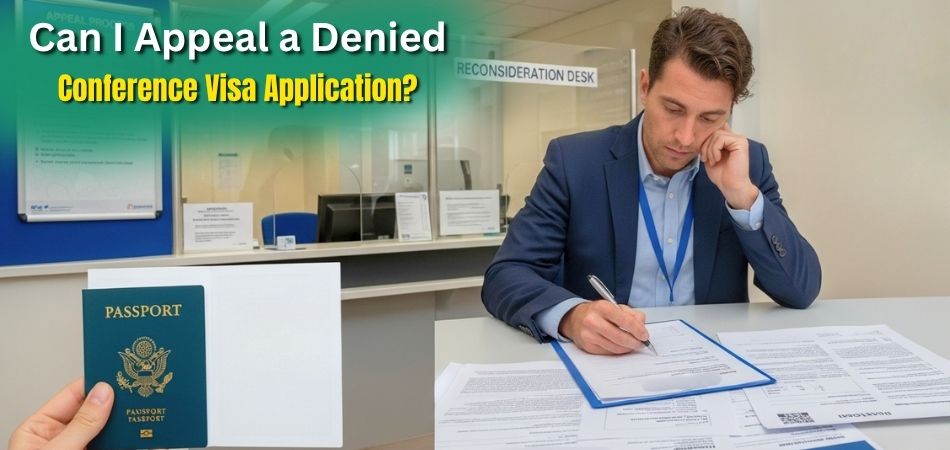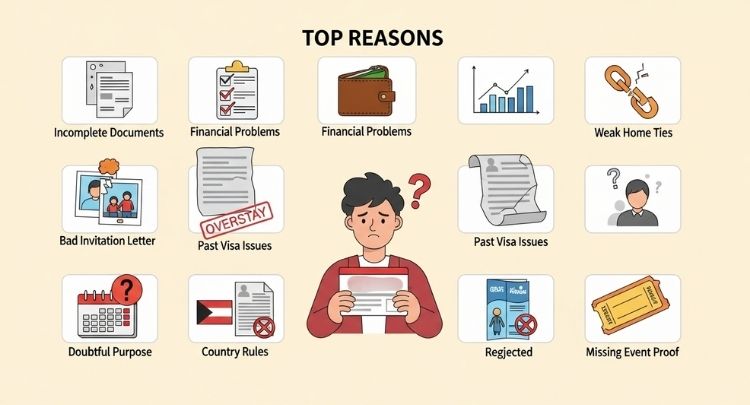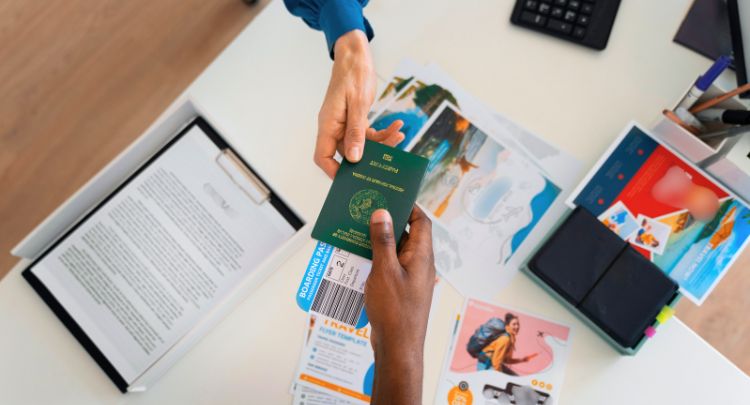Traveling abroad for a conference can be an exciting opportunity to learn, network, and share ideas. But for many applicants, getting a visa is the first major hurdle. A denied visa often feels discouraging, leaving people wondering if their plans have hit a dead end. The good news is that in some cases, you may still have options to move forward.
So, if you are wondering to yourself, “Can I appeal a denied conference visa application?” The answer depends on the country.
Yes, you can sometimes appeal a denied conference visa, but it depends on the country. Some places, such as Australia, allow appeals with a deadline. In the U.S., you must reapply instead. Always read the refusal letter carefully and add new or better documents if you apply again.
Keep reading to explore your options in detail
Can I Appeal a Denied Conference Visa Application?
Yes, you can sometimes appeal a denied conference visa application, but the answer depends on the country. Some nations provide a structured appeal process with strict deadlines, while others require a fresh application instead. The refusal notice always includes key details about appeal rights, timelines, and relevant authorities. Here are some of the main points you need to know about appealing or reapplying after a conference visa denial:
Country-Specific Appeal Rights
Different countries outline unique procedures that determine if an appeal can actually be made. Reading the refusal letter carefully highlights these specific rights and clarifies the route applicants need to follow. Without understanding these details, applicants may miss deadlines or mistakenly reapply instead of pursuing an appeal.
Each refusal notice holds legal directions tailored to the particular visa policy of the issuing nation. These instructions clarify available pathways and specify which bodies handle such appeals. Knowing these details early ensures applicants prepare appropriately within the allowed timeframe without risking unnecessary delays.
Role of the Refusal Letter
The refusal letter functions as the single most important document after a visa denial is received. It outlines whether appeals are available, their deadlines, and where to file them. Applicants must read the letter immediately to understand potential steps clearly without confusion.
Inside the refusal notice, detailed reasons for rejection explain what went wrong with the original application. Addressing these errors can strengthen either a formal appeal or a new reapplication. Ignoring the letter prevents applicants from fixing weaknesses and reduces future chances of success.
Appeals in Australia
Australia allows appeals to the Administrative Review Tribunal or relevant courts, depending on the visa type. Applicants must follow strict filing deadlines and ensure all required forms are completed correctly. Missing the timeframe usually eliminates the right to appeal completely without second chances.
However, not every conference visa decision in Australia is open to appeal. Certain refusals cannot be contested before a tribunal or court. Reviewing the refusal letter immediately helps applicants confirm eligibility before spending money on legal advice.
No Appeals in the United States
Unlike Australia, the United States does not provide a direct appeal pathway for visa refusals. Instead, applicants must reapply with corrected documents and stronger supporting evidence. Adding a valid invitation letter and clarifying reasons for denial improves approval odds.
Applicants often believe appealing is possible, but the process does not exist for American visas. Every new application must address concerns raised in the initial denial. Careful preparation and additional paperwork often make a meaningful difference when trying again.
Schengen Visa Objection Rights
Many Schengen countries allow applicants to file objections or appeals within a specified timeframe. These appeals often require a written explanation describing why the refusal was incorrect or unfair. Sometimes, supporting evidence can be attached to strengthen the claim.
Applicants should carefully craft appeal letters and focus on the refusal reasons provided in the official notice. Including irrelevant details usually weakens the overall appeal. Seeking help from immigration experts can significantly improve the clarity and strength of the objection.
Importance of Expert Guidance
Consulting an immigration lawyer often helps applicants identify viable strategies when facing visa refusals. Lawyers understand deadlines, drafting requirements, and appeal procedures more thoroughly than most individuals. This guidance prevents wasted effort and increases chances of approval.
Seeking advice early ensures mistakes from the initial application are not repeated during appeals or reapplications. Experienced experts can assess refusal reasons and recommend suitable documentation. Their support is especially valuable when preparing cases for strict tribunals.
Reapplying with Stronger Evidence
If appealing is not an option, applicants may reapply with improved documents and explanations. Adding missing papers and fixing earlier issues increases the chances of approval significantly. Presenting updated records demonstrates commitment and reduces doubts from visa officers.
For instance, travelers invited to a global conference in Canada may need to include detailed event documents. Supplying stronger financial proof or invitation letters often changes the officer’s perspective. Preparing carefully ensures the second application avoids the mistakes of the first.
Strict Deadlines and Procedures
Timeframes for appeals are often short, requiring quick action. Delays usually eliminate the chance to pursue the case further. Applicants must always respect these strict deadlines to keep their chances alive.
Appeal procedures involve legal formalities that cannot be overlooked. Incorrectly filed appeals often get dismissed without a full review. Following official requirements closely ensures the case receives fair consideration.
Common Mistakes Applicants Make After a Denial
Facing a conference visa denial can feel discouraging, but the reaction afterward often decides the outcome of future attempts. Many applicants panic, repeat errors, or ignore critical instructions given by immigration authorities. By avoiding these mistakes, the chances of success on appeal or reapplication increase. Let’s look at the most common missteps people make after receiving a refusal.
- Ignoring Refusal Letter: Applicants sometimes ignore the details provided in the refusal notice, missing critical deadlines that explain appeal rights and reapplication options.
- Submitting the Same Documents: People often reapply with identical paperwork, failing to address concerns raised earlier, which usually results in another quick rejection.
- Overlooking Deadlines: Strict timeframes for appeals or objections exist, but some applicants delay action, losing their chance completely without possible recovery.
- Skipping Expert Advice: Applicants frequently avoid consulting professionals, missing helpful strategies that lawyers or advisors can provide for stronger case preparation.
- Providing Weak Evidence: Insufficient proof of finances, travel purpose, or ties often weakens reapplications, leaving officers doubtful and unwilling to approve requests.
- Emotional Responses: Frustrated applicants sometimes write angry letters or confront officials, which damages credibility and reduces chances of a favorable decision.
- Not Researching Rules: Applicants fail to study country-specific requirements, causing repeated errors that prevent appeals or reapplications from moving forward successfully.
What Are the Reasons for Denials of Conference Visa Applications?
Conference visa applications often get refused due to several avoidable issues. Each refusal is explained in the refusal letter provided. Understanding these common causes helps applicants prepare stronger, clearer, and more reliable applications for future attempts.
Incomplete Documentation
- Missing papers often raise doubts, forcing officers to believe applicants are hiding something, even if it was an honest mistake.
- Supporting documents not translated or certified create confusion, making the application appear inconsistent and unreliable in the officer’s view.
Financial Instability
- Weak financial proof often suggests applicants cannot support themselves, which raises doubts about returning home after the event.
- Bank statements without proper balances or unexplained deposits often trigger concerns about authenticity and overall financial credibility.
Weak Ties to Home
- Applicants failing to show strong family, employment, or property connections often struggle to convince officers to return.
- Lack of proof about community involvement, commitments, or local responsibilities reduces confidence about the applicant’s long-term stability.
Invitation Letter Issues
- Invitation letters missing details about purpose, duration, or event credibility often confuse officers about the applicant’s true intentions.
- Outdated or poorly worded invitations usually raise suspicion, making officers question the authenticity of the event itself.
Previous Immigration Concerns
- Prior overstays, visa violations, or deportations often influence decisions, even when applicants try to demonstrate changed behavior.
- Immigration history reflecting repeated rejections or misconduct discourages officers from trusting the new application’s merit.
Purpose of Travel Doubts
- Officers sometimes believe applicants may misuse the conference visa for unrelated work, personal stays, or hidden purposes.
- Applications with vague agendas or inconsistent schedules usually cause suspicion, making approval less likely.
Country-Specific Rules
- Every country has unique regulations that define whether appeals are possible or reapplication is required after refusal.
- Applicants should always confirm legal procedures since a denied conference visa application in one nation may demand reapplication elsewhere.
Insufficient Evidence of Event
- Applications without official brochures, registration receipts, or verified conference details weaken the case significantly.
- Officers expect applicants to prove event authenticity, and missing proof usually leads to rejection.
Are There Deadlines for Filing an Appeal After Visa Application is Denied?
Yes, there are deadlines for filing a visa appeal after a visa application is denied, and these deadlines vary by country and visa type:
- Generally, you have around 28 days from the date you receive the visa refusal decision to file an appeal. In some cases, this period can be shorter, such as 2 days.
- For Australia, for example, the appeal to the Administrative Appeals Tribunal (AAT) must be lodged within the relevant deadline stated in the refusal letter, typically about 28 days.
- In the UK, appeals should be filed within two weeks of receiving the visa denial letter if you are inside the UK, or within 28 days if you are outside the UK.
- In Norway, the deadline to appeal a visa decision is within 3 weeks after receipt of the decision letter.
- Canada requires a Notice of Appeal to be filed within 30 days of the refusal letter date.
Deadlines are strictly enforced, and sometimes the refusal letter will specify the exact timeframe. If it is not possible to submit all supporting documents within the deadline, it is often recommended to still file the appeal within the deadline with an explanation and request extra time for submitting additional documents.
What Steps Should You Take After a Visa Refusal?
Getting a visa refusal can feel very disappointing and confusing at the same time, leaving many questions unanswered. Most people wonder what exactly went wrong and how they can fix it on the next try. Some even think their dream is completely over, which is rarely true. Instead of stressing too much, the best step is to stay calm and understand what needs to be done.
Read the Refusal Letter
The first step is always to read the refusal letter carefully without skipping anything. This letter explains why your application was refused. It also shows if you can appeal or only reapply. Understanding the reason helps you prepare a stronger application the next time.
Stay Calm
It is normal to feel upset, but panicking will not help you move forward. A cool mind helps you think clearly. If you get stressed, you may miss important details about what to do next. Take some rest, then focus on your next move.
Check the Rules
Every country has its own rules when it comes to visa refusals. Some allow appeals, while others want you to reapply. Always confirm the rules written in your refusal notice. Knowing these rules avoids wasting time and helps you take the right path.
Gather Strong Documents
Sometimes your papers are not enough to prove your purpose or financial stability. Collect new and better documents to support your case. For example, stronger bank statements or updated invitations make a big difference. Good paperwork builds more trust with the visa officer.
Ask for Advice
Talking to an immigration expert or lawyer can guide you in the right way. They know how different countries work with appeals and reapplications. Expert advice saves time and reduces common mistakes. Their support makes your application more complete and clear.
Learn from Mistakes
Think about what went wrong in your earlier application. Did you miss a document, or was your reason unclear? Learning from mistakes helps you avoid repeating them. Even tricky cases like the chance of getting a conference visa after overstaying can improve with proper corrections.
Try Again
One refusal does not mean you will never get approved. Many people succeed after making changes and reapplying. Use the new knowledge, stronger documents, and advice you have gathered. Trying again with better preparation gives you a higher chance of success.
What Documents Can Strengthen Your Appeal?
When a visa application gets refused, an appeal may still give you another chance. Success depends on the strength of your documents. The right papers explain your case and clear doubts raised by the visa officer. Submitting them properly improves your chances of approval.
- Refusal Letter: The refusal notice explains the exact reasons for denial, helping you build your case and address issues directly.
- Identity Records: Passports, visas, and immigration history provide clear proof of who you are and show your travel background without confusion.
- Financial Proof: Bank statements, income slips, or savings certificates demonstrate you have enough funds to cover travel expenses and personal stay needs.
- Invitation Letters: Conference invitations confirm your reason for travel and highlight event details that support your request for visa approval.
- Home Country Ties: Property deeds, family records, or work letters prove strong connections at home, convincing officers you plan to return.
- Medical or Educational Papers: Relevant medical reports or academic certificates show genuine reasons for travel and help clear doubts raised in refusals.
- Certified Translations: Non-English papers must include certified translations and original versions, preventing confusion and ensuring officers fully understand your evidence.
- Witness Testimonies: Statements from family, employers, or community leaders add credibility and support, especially where character or relationship doubts exist.
- Appeal Letter: A well-prepared appeal letter explains mistakes in the refusal, adds new evidence, and strengthens the case for approval.
FAQs About Appealing a Denied Conference Visa Application
Getting a conference visa denied can feel stressful and confusing. Many people have extra questions beyond the basic appeal process. Here are some common queries and clear answers to guide you through this situation.
How Long Does a Visa Appeal Usually Take?
The time for a visa appeal depends on the country, tribunal, and case complexity. Some appeals take weeks, while others extend for months. Always check official timelines mentioned in your refusal letter to plan accordingly and avoid surprises.
Can I Travel While My Appeal Is Pending?
Most countries do not allow travel using the same application during an ongoing appeal. You must usually wait for the decision. In some cases, you may apply for another visa, but this depends on the country’s rules.
Do I Need a Lawyer for a Visa Appeal?
Hiring a lawyer is not always required, but it often helps. Lawyers understand legal terms, prepare strong documents, and provide better. If your case is complex, expert advice can save time and improve approval chances.
Will an Appeal Affect Future Applications?
Filing an appeal does not usually harm future applications. What matters most is whether you address the reasons for refusal. If handled properly, an appeal can show effort, but repeated weak applications may harm credibility later.
Can I Submit New Evidence During Appeal?
Yes, you can often provide new or stronger evidence that supports your appeal. This may include updated financial papers, better invitation letters, or stronger proof of ties. Submitting fresh evidence improves your appeal’s credibility and strengthens your case.
What Happens If My Appeal Is Rejected?
If your appeal is unsuccessful, you may still reapply with stronger documents. Many countries allow reapplications even after appeals fail. It’s important to correct earlier mistakes, add better evidence, and follow official instructions for the new application.
Are Appeal Fees Refundable If Denied?
No, appeal fees are generally non-refundable even if your case is denied. These fees cover the administrative costs of processing the appeal. Always confirm the fee structure before filing to avoid financial surprises and unnecessary expenses.
Can I Track the Progress of My Appeal?
Yes, many authorities provide tracking systems or reference numbers for appeals. You can check updates through official websites or by contacting appeal bodies. Staying updated helps you prepare for the next steps while waiting for a decision.
Final Considerations
A visa refusal can feel hard, but it is not the end of your travel dream. Each country has different rules, so knowing if you must appeal or reapply is very important. The refusal letter explains the reasons and shows the next step clearly.
Asking experts for help and adding better documents can improve your case. Many people ask themselves Can I appeal a denied conference visa application, and the answer depends on the rules of that country. With calm effort and correct steps, you still have a good chance to succeed.








